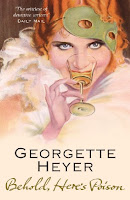 |
| (Amazon UK link) |
I picked up 'Behold, here's poison' last year from Amazon's Marketplace, and it's sat on my shelves for a while. I decided to read it this week, and while it took me a few chapters to get into it, I found it quite hard to put down by the end.
The victim in this story is grumpy old Uncle Gregory, found deceased by his butler in the first chapter. We see the viewpoint of one of the maids at the start, telling us what she thinks of each member of the family, and I found this a bit confusing. However, as with most of Heyer's books, I quickly worked out who was whom and easily remembered the important characters.
While the doctor initially thinks that Uncle Gregory must have had a stroke, brought on by high blood pressure and over-rich food; but his sister demands an inquest. So suddenly the household is deep in suspicion, particularly when it's discovered that he was, in fact, poisoned. Hardly a spoiler, given the title of the novel. The majority of the book revoles around the question of who did the unpleasant deed.
Georgette Heyer's detective stories don't have such clever plotting as Agatha Christie's, but their characterisation, in my view, is always very well done. I was pleased that this book re-introduces the intelligent Superintendent Hannasyde from Scotland Yard who has featured in various other of Heyer's crime novels, and his sidekick, Inspector Hemmingway. The pair are frequently foiled in their investigations, not just by the lack of clues in this particular puzzle, but by the prevarication of Uncle Gregory's family. Most of them had plenty of motivation to bump him off, but insufficient expertise or, indeed, opportunity.
Just when it appears that the crime may never be solved - as most of the family hope - another one is committed, which confuses everyone still more and causes the domestic staff to give notice. I was pleased that I managed to figure out the reason for the second crime before any of the characters did, but I was still at a loss regarding the first and had not guessed the identity of the perpetrator.
The ending, when it came, was - in my view - rather sudden and abrupt. While it made sense, it didn't give the satisfaction that the final resolution of a Christie book usually does; there were not really sufficient clues (nor red herrings, for that matter) and I'm not sure that reading it through again would indicate the criminal clearly to one in the know.
Still, as a piece of social history, and some nice characterisation, I thought it a good book. Recommended to anyone who likes this genre of light detective novels. I'm pleased to see that, though out of print for a while, it has recently been republished and is currently available on both sides of the Atlantic.
Review copyright Sue's Book Reviews, 6th July 2012
1 comment:
Just found your blog looking for reviews of Rachel Hore's 'The Dream House'.
I'm also a great Heyer fan and am re-reading some on Kindle. Visit to local hospice charity shop today and found two for 15 pence each - couldn't believe my luck. Haven't read any of her detective novels but will look out for them now - thanks.
Post a Comment